The Bookwalker: Thief of Tales review – Isometric science fantasy adventure/RPG takes novel approach to storytelling
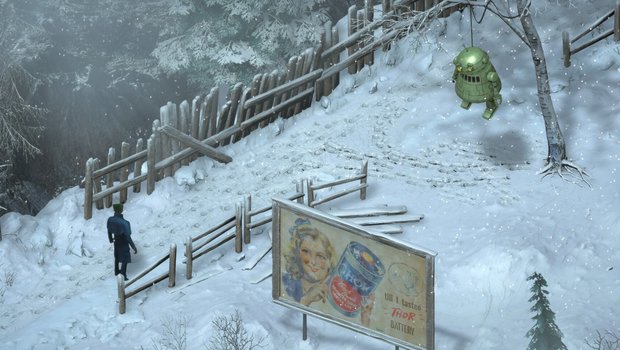
- 0 Comments
Think of the last time you read your favorite book. What images, emotions, or memories does it bring up? These books stick with us for so many reasons – an unforgettable character, an arresting plot that kept you in suspense ’til the last page, maybe an epic and satisfying climax. For many of us, these books helped shape our lives and personalities in critical ways, and no matter how much time has passed since we last cracked them open, there’s a deep comfort in their immutable nature. Though time may pass and the world may change, these books will remain the same as the first time you read them. Or at least you think they will.
Enter Do My Best’s The Bookwalker: Thief of Tales, the story of a man with the power to enter any book and alter it from within, setting characters on new paths and removing pivotal items found within their pages, potentially altering outcomes in fundamental ways. Just as the eponymous protagonist explores various literary genres (via entirely fictitious books) over the course of its ten-hour runtime, so too is the game a blend of styles, namely point-and-click isometric adventure mechanics underpinned by visual novel storytelling, with some (fairly light) turn-based combat sections, and even a few first-person exploration sections thrown in for good measure to break up the book dives. It tells an intriguing if rather bleak tale (while incorporating the occasional burst of humor), though it succeeds more as a collection of individual scenarios that turn out to be more memorable than the sum of their parts.
The Bookwalker wastes zero time throwing you into the thick of things. You are Etienne Quist, a writer who has been prohibited from writing – a troublesome proposition that creates the right headspace to explore this game’s themes and ideas. Though we’re not given much information early on, we do know that Etienne has been convicted of what must have been a heinous crime and sentenced to wear a physical writer’s block – literal metal shackles around his wrists – meant to keep him from putting pen to paper or suffer excruciating pain for the next thirty years. The concept of a governing body with the ability to censor the proliferation of thought in this way is scary, and the ability to enact such a restriction on its citizens points to an authoritarian society the likes of which is frightening to imagine.
Through a mutual contact, Etienne falls in with a dubious shadow organization – complete with a disembodied voice communicating with him via phone and clandestine item exchanges – promising to release his shackles well ahead of schedule in exchange for successfully completing a number of highly suspect contracts for them. The work in question? Etienne must further defy the law by traveling into predetermined books to retrieve several extremely valuable items and bring them back into the real world.
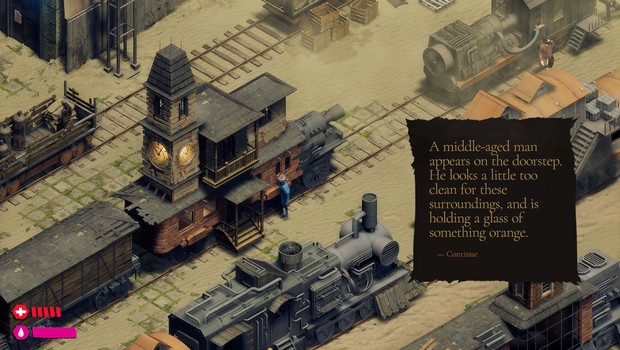
The idea of books and reality intersecting is an intriguing concept I’ve seen explored in fantasy novels before, immediately calling to mind some particular childhood favorites such as Ende’s The Neverending Story or Funke’s Inkheart. But though The Bookwalker’s premise may seem similarly tailor-made for an adolescent audience, its execution is darker and more mature, dealing with the realistic consequences to the worlds and characters of books if crucial details were to be forcibly removed from their narratives. Over the course of the game, Etienne will travel to such varied literary locations as a spaceship piloted through the vast reaches of space by a rogue AI administrator, a magical school of wizardry and witchcraft (no, not that one), a blasted postapocalyptic hellscape where trains must cross immense deserts to reach the last remaining vestiges of humanity, and an industrial world locked in snow and ice where robots have risen up against their human counterparts.
Each new backdrop (there are six books to journey through, plus an epilogue) presents a fresh opportunity for discovery, working out its unique rules and quirks, figuring out the particulars of its setting, and learning how best to interact with (or avoid) its denizens. Ultimately, though, your objective in each new place is the same: locate an item Etienne’s been tasked with finding, and devise a way to get your hands on it in order to wrench it out of the story and into the real world. While each chapter remains fairly linear, you are allowed to make some minor dialogue choices along the way that may impact a few events, such as how a given character responds or whether Etienne will need to engage in combat or not. A more critical bit of player agency appears near the end of each chapter, when you must make a decision that impacts how you resolve your current mission.
These moral dilemmas (and a bit of role-playing) offer the chance to shape Etienne’s character somewhat to your liking, although they don’t affect the game as a whole very much. Take, for example, a task early on that sees you having to retrieve a potion of immortality. Will you alter your mission by leaving part of the potion behind for a book character planning to revive his deceased wife with it, or will you honor your client’s wishes and bring back the full amount, dooming the poor sod’s soulmate? Does the fate of fictitious characters encountered in the pages of books matter to Etienne, or is he a heartless pragmatist who knows that they aren’t real? It’s intriguing to confront these choices, even if they aren’t much more than in-the-moment window dressing.
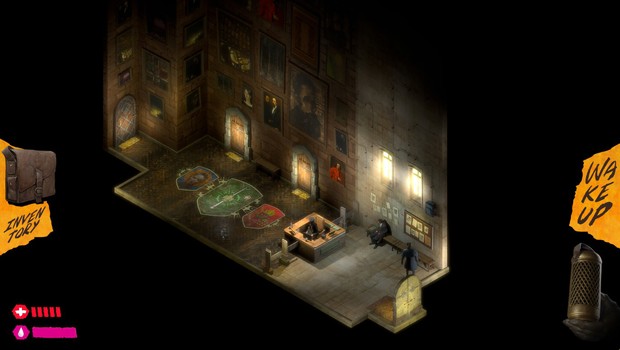
There’s a dark tone pervading throughout, and yet the writing often achieves quite a humorous bent. The lion’s share of this levity comes from the dynamic between the game’s two primary protagonists. Within the first few minutes of the game, Etienne stumbles across a small handheld container that appears somehow to house a sentient consciousness, a traveler ripped from his own book though he has no recollection what it may have been. Calling him Roderick (in the absence of any memory of a proper name) and taking the container into his possession, Etienne partners up with this opinionated being who does not shy away from becoming his voice of reason when it becomes necessary. As a book character himself, Roderick is often able to scan through the texts Etienne must navigate, in the process gleaning important insight he can pass on to Etienne during the missions (if Etienne is even open to it, as he will hilariously become cross with Roderick for providing the occasional spoiler). The two also frequently engage in verbal spats, which more than once procured a wry smile from me, despite Roderick being nothing more than a disembodied voice emanating from a cylindrical cannister.
The gameplay during these “in-book missions” may closely resemble an RPG but most of it will be instantly familiar to point-and-click adventure enthusiasts: simply click on a place, person or thing to go there or interact with it if possible. Where The Bookwalker deviates some is by also introducing a very simple crafting mechanic, which amounts to collecting a number of bits and bobs, then finding a crafting bench to construct a tool needed somewhere in the chapter, be it a lockpick to open a drawer, a crowbar to pry open an uncooperative hatch, or a couple of other possible scenarios.
Additionally, Etienne will get into the occasional scuffle with creatures or other book characters that must be resolved in a turn-based combat encounter. If that isn’t where you feel most at home, fret not: these battles are generally few and far between, and they’re so easy I didn’t even die once. In fact, even when trying to for research, the enemy’s horrendous hit rate meant I had a hard time forcing a death state at all, and when it did happen the game either pushed me through, refilled my health, or at worst kicked me back to just before the battle to try again. Some skirmishes can even be avoided entirely through skillful dialogue choices.
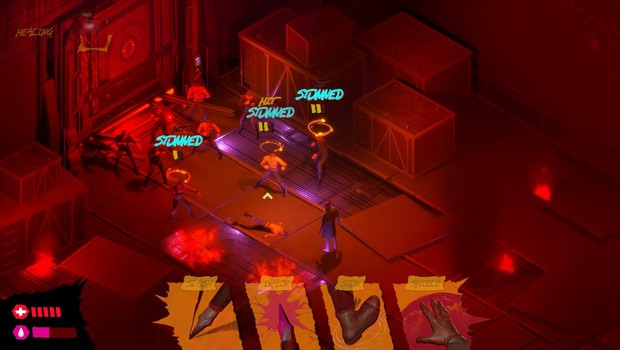
When fighting is unavoidable, you simply click on the skill you’d like Etienne to use – like Shield for protection or Stun to keep foes at bay) or consume a healing item if one is available. Each skill uses up a certain amount of ink, which can be regained through items found in the world or by using certain combat skills, and you can learn a new skill or improve an old one before each new chapter begins. It’s never overly complicated and could charitably even be considered just another puzzle to solve; either way, it is easily manageable for anyone with a basic understanding of typical turn-based RPG combat.
The contracts that send you on Etienne’s Bookwalker missions are bookended (pun intended) by brief first-person segments in which you get to explore the writer’s humble digs and the tenement building his flat is located in. By interacting with his small handful of neighbors (only through closed doors, via text boxes, mind you) you’ll immediately get a better sense of what kind of dystopian world you’ve landed in here. Suspicious questions, whispered warnings, audible breathing on the other side of the door despite there being no answer to your knocks – everything paints an alienating, solitary portrait of a society with the same palpable fear of strangers, an authoritarian controlling body, and citizens acting in clandestine shadows for fear of discovery and persecution as in WWII-era Germany, for example.
These opportunities to explore Etienne’s home world aren’t just for mood and atmosphere, either. A number of obstacles within the books require making use of the (convenient) ability to leave its pages and return to the exact same spot. For instance, early in the first mission you find yourself confronted by a brick wall that seems loose enough to knock down yet beyond Etienne’s current ability to budge. Tutorial-like instructions immediately direct you to have a chat with Etienne’s real-world neighbor, who may have a tool that you can drag back into the book world and use to engage in some demolition. This type of dual-world problem solving appears a number of other times over the course of the game. It’s generally pretty intuitive when it’s needed, but I found myself stuck at least once for a few minutes, revisiting locations over and over and not able to progress because I had completely forgotten about my ability to rope in someone back home.
It’s also neat to see how the apartment building subtly changes from chapter to chapter. With a week elapsing between each mission, there are always a few nuances worth exploring before diving back into the book worlds, like newly arrived mail and bills or recent developments in the building. Likewise, as Etienne receives further (modest) payouts for completed jobs, his flat – which starts out as spartan as can be – becomes increasingly more furnished and lived-in as time progresses.
While wandering through a structure populated by other tenants you never physically see or hear creates a palpable feeling of isolation, it’s a cost-effective way to reduce needed assets. Similarly, the game has no voiced dialogue (other than Etienne occasionally mumbling to himself in a nonsense gibberish) and while there is a somber instrumental soundtrack, it’s generally understated and lacks memorable moments. Fortunately the visuals have quite a bit to offer; the book worlds feature hand-drawn isometric environments reminiscent of dioramas filled with realistic detail and atmospheric light sources. However, an odd default setting is that interiors only occupy part of the screen, with lots of unused negative space surrounding them, making it harder to appreciate their inherent detail, when an optional zoom function comes included anyway. Outdoor scenes are presented from the same bird’s-eye perspective, though they nicely fill out all available on-screen real estate.
Meanwhile, Etienne and Roderick’s partnership continues to pay narrative dividends; Roderick has a vested interest in how Etienne treats other book characters, and he isn’t afraid to say so. Eventually we get let in on the whole reason Etienne is in this mess in the first place – what he’s done to get into trouble with the authorities, and why he’s no longer allowed to produce stories of his own, though Roderick’s background remains more of a mystery, with only a flaccid identity reveal at the very end. The same holds true for the eventual payoff that concludes the game itself, making The Bookwalker definitely more about the journey than its ultimate destination. I found the time spent in various books – experiencing the lethal struggle for resources between the haves and have-nots in a dying desert world, analyzing the psychology behind a megalomaniacal AI, chasing a madman through a decrepit medieval dungeon only to have the rug pulled out from under me – far more intriguing than the out-of-the-blue climax that succeeded it.
Final Verdict
The Bookwalker: Thief of Tales provides an accurate snapshot of what to expect within its first few minutes, yet it continues to dish up moments of discovery and surprise throughout. Performing illegal heists by delving into literary works is a thought-provoking conceit, and there are enough such chapters set in new and outlandish worlds to provide a constant thrill of excitement as events unfold. The mechanics – whether point-and-click or turn-based combat – aren’t difficult and should provide a low barrier of entry even for players not accustomed to RPGs. Most importantly, the characters and their interactions and moral dilemmas are just as intriguing as the varied worlds we get to explore, as well as being laugh-out-loud funny at times. Though the ending wasn’t quite satisfying enough for my liking, it’s a well-made and somber tale that deftly engages the darker side of imagination.
Hot take
The Bookwalker isn’t about inventing new wheels but combining familiar concepts in intriguing ways, ably marrying point-and-click adventuring and turn-based combat to provide a dark world to explore, filled with surprises that are ultimately more intriguing than its grand finale.
Pros
- Variety of unique, fantastical locations to explore
- Writing successfully blends equal parts mystery, moral dilemmas, and genuine humor
- Book worlds presented in realistic, highly detailed diorama-style sets
- Literal thought police is a dark conceit for some mature world-building
Cons
- Mission-to-mission gameplay is more intriguing than the overarching story and its underwhelming ending
- Subdued score never distinguishes itself
- Combat is so easy it begs the question why it's even there in the first place
Pascal played The Bookwalker: Thief of Tales on PC using a review code provided by the game's publisher.





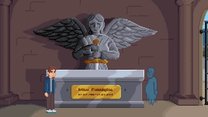


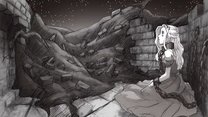

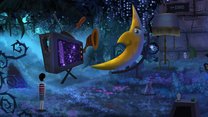
0 Comments
Want to join the discussion? Leave a comment as guest, sign in or register in our forums.
Leave a comment